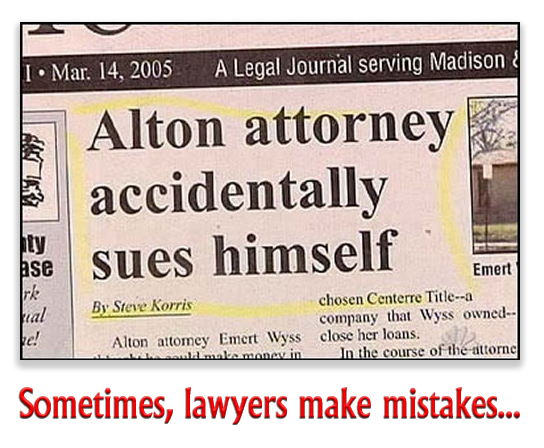We post news and comment on federal criminal justice issues, focused primarily on trial and post-conviction matters, legislative initiatives, and sentencing issues.

6th CIRCUIT ISSUES FASCINATING INEFFECTIVE-ASSISTANCE DECISION ABOUT BAD ADVICE ON PLEA DEALS
T ell me if this sounds familiar: a defendant is charged with a crime. His or her court-appointed attorney discourages making any plea deal with the government, because counsel can win it for sure at trial. At trial, defense counsel completely misunderstands the law, and mangles the defense. Defendant is convicted, and gets hammered.
ell me if this sounds familiar: a defendant is charged with a crime. His or her court-appointed attorney discourages making any plea deal with the government, because counsel can win it for sure at trial. At trial, defense counsel completely misunderstands the law, and mangles the defense. Defendant is convicted, and gets hammered.
That’s what played out at the 6th Circuit last week. The Court granted habeas corpus to a Michigan inmate who was convicted of aiding and abetting a robbery-turned-murder. Billy Joe Byrd and his girlfriend Bobbie Sue decided to commit a robbery. Billy Joe got cold feet before the crime, but he gave Bobbie Sue his gun. Bobbie Sue shot a man while robbing his castle. Rather than heading down south with Bobbie Sue, Billy Joe turned himself in.
In Michigan, aiding and abetting a murder carries the same sentence as the murder itself, mandatory life. Billy Joe wanted to make a plea deal, but his court-appointed attorney convinced him that because he had walked away from the crime before it happened, he could not be convicted. He told Billy Joe it didn’t matter even if he gave Bobbie Sue the gun knowing she was going to rob the Gasso, because he did not intend that she do so.
 Alas, the defense attorney was as wrong as he could be. Michigan requires a defendant claiming abandonment as an affirmative defense to establish “by a preponderance of the evidence voluntary and complete abandonment of a criminal purpose.” In fact a prior Michigan Court of Appeals case, People v. Akins, held that, despite the defendant’s defense that he changed his mind about a robbery, his abandonment defense failed because, among other things, he “gave his gun to [the principal], knowing that it would be used to commit the robbery.”
Alas, the defense attorney was as wrong as he could be. Michigan requires a defendant claiming abandonment as an affirmative defense to establish “by a preponderance of the evidence voluntary and complete abandonment of a criminal purpose.” In fact a prior Michigan Court of Appeals case, People v. Akins, held that, despite the defendant’s defense that he changed his mind about a robbery, his abandonment defense failed because, among other things, he “gave his gun to [the principal], knowing that it would be used to commit the robbery.”
Bobbie Sue had a better lawyer. She pled to second-degree murder and got 30 years. In fact, she testified against Billie Joe. That’s not in the song.
The 6th Circuit was incredulous that defense counsel met with Billy Joe for a grand total of 60 minutes between indictment and trial. Billy Joe said that during their meetings, the lawyer did not review the sentencing guidelines or explain aiding and abetting or other legal concepts underlying the case. The lawyer “baldly denied these allegations but also testified that he did not remember his conversations” with Billy Joe “precisely” or “particularly.”
In that court, prosecutors wait for defense counsel to request an offer before beginning negotiations. Then, the prosecutor will develop a proposal and consult with the interested parties. The judges in that court rarely reject plea agreements. Billy Joe “was denied the opportunity to accept a lesser charge and more lenient sentence because his trial counsel,” the 6th said, “never initiated plea negotiations with the prosecutor’s office.”
The District Court refused Billy Joe any post-conviction relief, holding that he could not prove he would have taken a plea offer. Besides, the government argued, the 6th Amendment only covers effective assistance when the government makes an offer. Here, Billy Joe never initiated plea negotiations.
The 6th Circuit said that did not matter, holding that “in the context of the right to effective assistance of counsel… the absence of a right to be offered a plea or to have it accepted… is beside the point’.” The Circuit said Billy Joe’s lawyer displayed “a shocking lack of comprehension regarding the pertinent law” in the case… A criminal defendant has a right to expect at least that his attorney will review the charges with him by explaining the elements necessary for the government to secure a conviction, discuss the evidence as it bears on those elements, and explain the sentencing exposure the defendant will face as a consequence of exercising each of the options available.”
The Government argued Billy Joe was not prejudiced, because he claimed he was innocent, and so would have gone to trial anyway. The 6th disagreed. Here, the defendant’s “interest in proceeding to trial was rooted in misinformation gleaned from his counsel’s faulty advice, making it an unreliable metric of reasonably probable outcomes.” Defense counsel’s advice to Billy Joe “was erroneous and omitted critical details” about the case. Thus, Billy Joe “lacked the requisite information to weigh the options in front of him, and whatever desire he exhibited before trial is not dispositive of what he would have done if he were properly educated about the charges against him.”
Byrd v. Skipper, 2019 U.S. App. LEXIS 30163 (6th Cir. Oct. 8, 2019)
– Thomas L. Root


